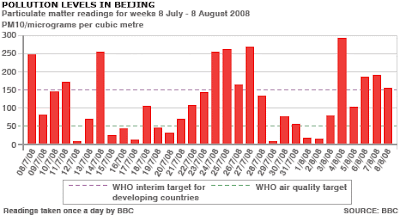
On the other side, the organizers of the Beijing Olympics are saying:
" Du said in the past seven days the Air Pollutant Index (API), an indicator of the air quality, in Beijing has been all below Level II, indicating excellent or good air quality.
"Maybe the fog makes it not a nice picture to look at the Bird's Nest or the Water Cube, but the monitor south of the two stadiums reads the API at 80 today. It conveyed a strong message that our efforts had paid off since August," he said. An API rating of 51-100 (level II) means good quality. "
What it comes down to is the number and how it was determined. It is amazing that scientists are capable of using modern technology to measure the same physical phenomenon and get such dramatically different numbers. Physical science is supposed to be above this sort of thing. If the data are distorted then who is distorting them? Is it more likely that the BBC is knowingly publishing false or skewed numbers to support a story and embarrass the host city and country or that the Olympic organizers have "adjusted" their numbers to look better. At least the BBC admits to a 20% error in their measurements. There is another possibility that both sets of numbers are false. We cannot know but there is a third voice on the issue from within China and on that blog this is a picture of the air quality today.
What we can know is how well the athletes respond to the air. According to the SOURCE OF ALL KNOWLEDGE (Wikipedia) an average human has a deep breath volume of about 5 liters. An adult will make about 40 deep respiration's per minute during physical exertion. So that is about 200 L of Beijing air a minute or one cubic meter of air every five minutes. You have to believe that even elite athletes pulling that kind of air into their lungs for that period of time will have to see an effect. This is the reverse of what high altitude training does to prepare and athlete. At high altitude the air pressure is lower so there is less oxygen, in response the body increases lung capacity and the number of red blood cells to capture as much oxygen as possible. When the athlete returns to sea level there is a short term benefit that can improve performance. In this case however what we are looking at are athletes that can perform well in bad air. I do believe that China may well have an advantage here.
As a post script to this issue there is also a bit of discussion about the air quality of these Olympics compared to air quality in previous Olympic cities such as Athens and Mexico City. According to the BBC this is what athletes faced in previous Olympics.
Other Olympic cities on the opening day of the Olympics:
London (United Kingdom) 21
Athens (Greece) 43
Sydney (Australia) 20
Seoul (Korea) 41
Beijing (China) 191
Source: World Bank 2004 and BBC 2008

No comments:
Post a Comment